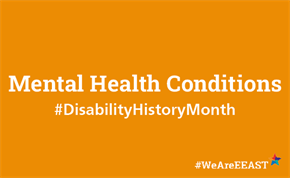Date:
26 April 2024
Page URL:
https://ntk.eastamb.nhs.uk/news/disability-history-month-mental-health-conditions.htm?pr=
Disability History Month: Mental Health Conditions

This Disability History Month, the next area we’re focusing on is mental health.
What is a mental health condition?
Mental health relates to a person’s psychological and emotional wellbeing - a mental health condition or illness can cause psychological and behavioural disturbances.
There are several different mental health conditions, from the more well-known such as depression and anxiety, to the perhaps less common, such as trichotillomania and selective mutism.
You can find information on all mental health conditions and their symptoms via the NHS website.
Living with a mental health condition
There may be events in our lives that can cause our mental health to deteriorate, such as losing someone you love, domestic abuse, divorce, work, a long-term health condition e.g., cancer, or if you’re feeling particularly stressed and overwhelmed.
On the other hand, for some, there is no reason that has caused them to develop a mental illness.
This is a great reminder to look out for one another’s wellbeing. It can be difficult to live with a disability that is seemingly invisible to everyone else – sometimes simply checking in to make sure someone is OK is enough.
Mental health conditions as disabilities
A mental health condition will more than likely be considered a disability under the Equality Act if it has a long-term effect on your normal, day-to-day activity.
- A condition is classed as long term if it lasts, or is likely to last, 12 months
- Normal day-to-day activity is defined as something you do regularly in a normal day, for example, using a computer or interacting with people
If your mental health condition fits these criteria, you will be protected from disability discrimination.
Find out more about the Mental Health Act via the NHS website.
That’s not to suggest that mental illnesses that don’t class as a disability are any less debilitating and difficult for people to live with. If you are suffering you should try to reach out for support from those around you, whether that be family, friends, or colleagues.
Find support, help and resources via Wellbeing.
Past, present, future
For a long time, mental health has been treated as a taboo subject and because of this it has not been spoken about. People who were suffering from a mental illness were not given treatment as we see today but were instead labelled ‘insane’ and put into a mental institute or mental asylum.
Unfortunately, people’s understanding of mental illness is still not as good as it could be. However, awareness of mental health has grown over the past few years and it’s becoming more talked about.
The aim is for mental health to eventually be seen as equally important to physical health by all.
Don’t forget, if you are struggling you can download the Headspace app for free and find further services and resources via the NHS website.
Do you suffer with a mental health condition? Get in touch with your story, we would love to hear from you!
Published 24th November 2022
